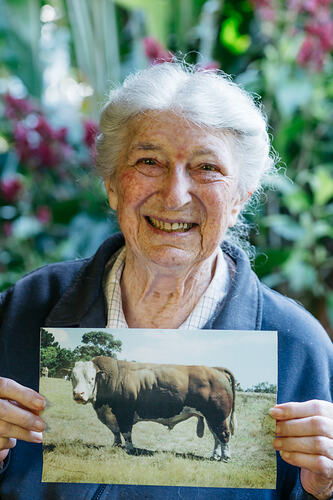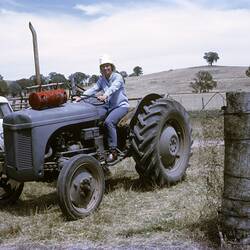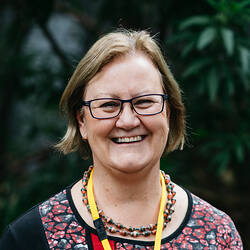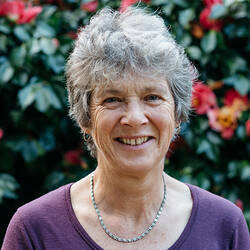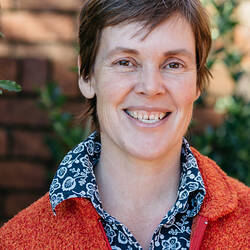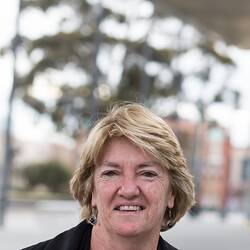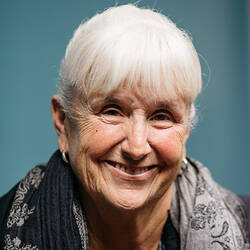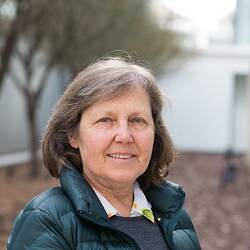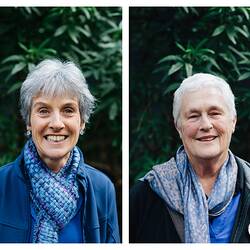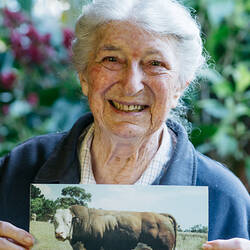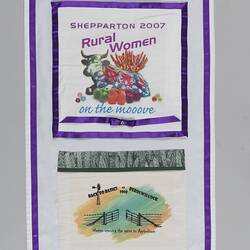Meredith Hayes was among one of the early cohorts of women to study agriculture at Dookie College in Victoria in the late 1940s-early 1950s. She was the only female in her graduating year, and went on to spend her life as a farmer and conservationist, receiving an Order of Australia for services to primary industry, conservation and the environment.
The following excerpts were taken from an interview with Meredith Hayes recorded by Invisible Farmer Project Curator Catherine Forge in Coorabell, Byron Bay, on 10 August 2015.
Did you have any connection to farming in your childhood and teenage years?
Well a number of my parents' friends and some of my relatives owned farms and when I was old enough I was able to spend holiday periods on either the properties of my families' friends or in one case, one of my father's close relatives. I always enjoyed it very much.
Can we talk about your education?
My mother had actually been sent to university, like her older sister. Fortunately, I had a grandfather who was really keen on educating all his children, not just myself, so I actually had a background grounded in the importance of education. Because of the background of my grandfather being keen on educating as many of the children it was sort of taken for granted. I obviously had an aptitude apparently for university type education, and it was sort of expected that I would take advantage of that if I wanted to, but I wasn't forced to at all.
Can you recall the experience of starting university and the journey that led you there?
Well I stayed at school at Merton Hall, and in those days you could matriculate to go straight to university at what was called the Leaving Standard, but most girls actually stayed on for a second year and did what they called Leaving Honours, which equipped them better really for university standard education. That coincided with the end of World War Two and the return of thousands of servicemen coming back into the system who were offered university education to suit them for their future careers. For some reason Agriculture appealed to a lot of the men and there was a limit to the intake into the university degree course in Agriculture, which would have been my choice. I was one of the non-returned service people who were unable to start in the normal sort of way because the numbers were just were beyond the capacity of the universities to take us all in. So, I chose to go to university at the same time as all these people and I chose the subjects that I would have been doing had I been admitted to straight into Agriculture. Those men had returned from war, there was a huge dropout rate at the end of their first year, and there was then room for several extra students who'd been denied entry because the numbers just were too great for the administration to cope with. So at that stage I had done the same subjects as all these chaps that had dropped out, but then the problem became that their compulsory second year of the Agricultural Science course, which I was aiming at, was at Dookie College in those days and was strictly confined to males only, except with some rare exceptions. By the time I needed to go to Dookie, there was no accommodation for women.
What did you do?
My future husband by then had established his claim, shall we say, on my affections and he managed to persuade the daughter of the Vice-Principal at Dookie to share her bedroom with me as accommodation because there was none. The accommodation for the male students was all in barrack-type, small bedroom accommodation for each individual but obviously not suitable for a single female to be part of, all sharing the same bathroom. As it turned out a cottage became available when the College needed to appoint an Entomology lecturer. It was a female appointment as it turned out and they allotted an unused small staff cottage, on the property, for her use which luckily had two bedrooms and so, I was actually allowed to occupy the second bedroom with a very nice single lady, a Miss Burrage, the Entomology lady. So everything was above board, at last.
I'm imagining there weren't many other women studying agriculture with you in those years?
No, there were no other applicants for that year that I'm aware of. There was one girl, who I got to know quite well, who had fallen behind. She was a year ahead of me and she'd fallen behind in Agricultural Chemistry, and I did have one year with this young lady. She had come from an outback station, somewhere out in Central Queensland to study and I don't quite know what happened in the end to her, but she obviously abandoned the idea finishing the course. I actually went through the rest of the course as the only female and it was very common for there not to be female students. Having had the benefit of a good secondary education at Merton Hall, I was way ahead of a lot of the students - the returned men - who hadn't had that benefit, so that my academic results at Dookie actually helped in a way because I was usually at or near the top of the academic list.
Did you feel in any way that you were treated differently by any of the staff or fellow students, being a woman?
No, not at all. I'd always been keen on riding and horses and things anyway, so that fact that we were using draught horses to run the machinery in those days up there, if it came to harnessing up horses to haul a hay wagon or something, I was probably better at it than a lot of the guys that had never been near a horse in their lives. I was used to farm animals because I'd spent childhood holidays on farms. I knew how to milk a cow by machine because I'd been to my cousin's dairy farm for holidays. No, I was probably at a bit of an advantage to a lot of the returned guys, just because of my childhood memories of holidays. So, there was no problem there. Obviously I couldn't be part of football team, but I'd always been keen on tennis and my husband to be was also keen on tennis, so he and I had some considerable success in the college championships. No, it worked out very easily really. It could have been difficult, but it wasn't.
Can we talk about starting up your own farm with your husband Ken?
I think I had known that I had always liked to farm. Ken was very happy with that aim in life because at that stage he'd had a childhood up in the countryside, up in the Dandenongs, and also there was the scheme whereby returned men were being enabled to become farm owners through the subdivision of big rural properties and the Soldier Settlement Scheme. And it happened that one became available at a place called Labertouche, the Melbourne end of the Latrobe Valley really. The dairy itself was by today's standards very old fashioned. It was what was called a walk-through dairy. One of my jobs early in the morning - the children would be still asleep thank goodness -I would keep a horse saddled in a stable, ready for me to just to get the cows out of the paddock. We'd have a paddock not too far away from the shed, so either myself or somebody would go and get the cows in and I would then go back and have a cup of tea and toast to take over to the shed, so that the men, who were actually on the job of milking them, were given a preliminary early breakfast snack if you like - tea and toast. It got them going.
Your role on the farm in those early years must have been quite busy because you were also becoming a mother and having a family.
Yes, it was a question of compromising. At one stage the youngest was confined to a pram with a little canvas sort of harness so that the child couldn't stand up in the pram and topple out, while I was doing something to move some cows in the yard or something. Some people would feel uncomfortable about constraining a child, but one had to make allowances when there was danger involved, like machinery in the machinery shed and things like that, or the danger of just falling out of the pram onto a concrete floor. The children could see the action in the cow yards when one lot of cows had finished milking and was sent on their way. Then one of the farm hands was getting another lot in, ready to go. There was always action going on, so they didn't seem deprived of their freedom.
And how did you balance the multiple roles of motherhood and farming?
How did I balance it? Well they were sort of inextricably part and parcel of each other really. We always had an evening meal with Ken and myself and the children. It was always fairly late, we liked to eat as a family, so the kids always had a fairly late evening meal instead of being already bathed and ready to be put to bed before daddy gets home from the office sort of routine. It was time that they had a meal late with us and they were put to bed probably very late, routinely, which meant they tended to sleep later in the mornings than a lot of city children would have been. So it seemed to work out alright. There was no kindergarten near us where we lived, so the children never had the opportunity of socialising on a regular basis. But if they were deprived I think it was made up for by being included in whatever was going on, on the farm.
What was day-to-day life like for you on the farm?
Well, when we moved to Bittern we actually started a dairying unit, not a big one, but a small Herringbone dairy. After the cows had been milked, there was quite a big job hosing down the concrete yards, twice a day. I was also persuaded by the Manager of the Victorian Egg Board to get involved with issues relating to egg production, as the quality of eggs in Victoria was abysmal at the time, and he found out that we had built a cage plant on our farm along with a cool room. Outside I had a very large vegetable patch, which I spent a lot of time and energy on. We also made hay on the farm, as most people needed to, so I'd sometimes drive a tractor with a hay rake.
Did you get involved with any community groups?
Yes, mainly on the conservation side of things. There had been the threat of an oil refinery being built right on our boundary at one stage, right next to our farm. So I got very involved in conservation of that area at the time. It was the time when Henry Bolte was Premier, and he was determined to industrialise down at Westernport Bay, and to have another oil refinery just near our properly. So on the morning of Henry Bolte's much publicised trip to Europe - to the industrialised Rhineland - we actually made an appointment to meet with the German Consul in South Yarra, to explain to them that they were not going to be very welcome. Goodness knows how much effect that had, but I think the message got through to the German end of decision-making that maybe it wasn't going to be as easy as they had been told by Premier Bolte. So I got involved, at that time, in a lot of committee work. I was also elected as councilor to the Australian Conservation Foundation, and we used to have council meetings once a month. I met some really interesting people on the council of ACF that had led campaigns to protect big areas. I met Judith Wright that way; she actually got billeted to stay at my home in Melbourne.
Did you get involved in the Rural Women's Movement of the 1980s-1990s?
Not really. I suppose I have been farming all my life anyway, and I didn't really have time to partake in women's networks. I can see where they were coming from, and I was pleased that women's networking was happening, but I was almost at wind down mode by the time that was happening. The Landcare community was probably the first involvement I had with community farming where a lot of women were involved, but I wasn't involved with 'Women on Farms' in particular.
How important has rural life and farming been in your life?
Oh I can't imagine it being anything else! I have no ambition to have done anything differently!
More Information
-
Keywords
Agriculture, Farming, Rural Women, Rural Industry, Rural Victoria, Women's Associations, Conservation, Sustainable Agriculture, Women's Movement, Gender Roles
-
Localities
-
Authors
-
Contributors
-
Article types
